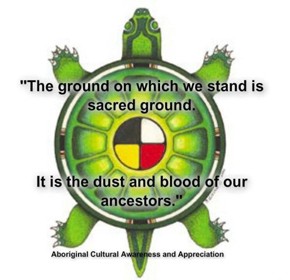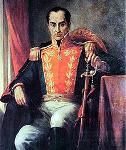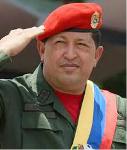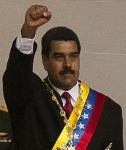Essay – Alliances and Signs of Empire Waning (By Mankh)

Not so far from the madding crowd of Global Corporate Empire and its superpower media bowl amping good guy v. bad guy — Obama, Kerry, Harper, Putin, Maduro, the Dalai Lama, Charlie Sheen, the Pope, Miley Cyrus, did I miss anyone? — is the reality of cooperation amongst like-minded yet distinct groups or Peoples.
The showboat boxing match with its attempts to blame everything on one person is often a smokescreen for faults of the blamer’s system, in this case Empire, the trans-national corporate-stat(e)us-(and thus by definition fascist)-quo, oligarchy, anti-Mother-Earthers, call it or them what you will.
In one corner of the smokescreen is rugged individualism, celebrity worship with its militant and/or soporific followers, and in the other corner, techno-slick mechanisms breeding Us (often US) v. Them. And in a third corner is corporate-state sponsored division and its bastard child, violence, whose aim is to overthrow democratically elected leaders — most recently, Ukraine’s Viktor Yanukovych, and ongoing attempts at Venezuela’s Nicolás Maduro.
But if we think beyond the corners of this Plato’s Cave of a box, arrows of light suddenly begin to enter. Community, solidarity, pluri-national… to name a few terms the aim of which is to join singular whistlings into a symphonic whole, rather than divide-and-conquer, the inherently destructive weapon of mass-colonialism.
How is this cooperative concept actually playing out on the geo-political chessboard? Various examples make for the gist of this essay, along with noting the trending global-view that the Empire is waning, though by no means down for the count — rather, feeling boxed into a corner and swinging madly with panic at the glimpse of its waning power.
Alliances and Communal Councils
 Simón Rodríguez |
 Simón Bolívar |
 Hugo Chavez |
 Nicolas Maduro |
Holding strong and showing no sign of weakening, Venezuela, under the banner of the Bolivarian Revolution, is warding off the infiltrative machinations of the Opposition and its US with others backing (though 34 people have been killed1). Much of Venezuela’s success stems from its broad base of support, both from the country’s people which includes the police, National Guard and Military. They respect Maduro who follows the guidelines of Chavez who followed those of Simón Bolívar’s who followed Simón Rodríguez, as well as cooperative efforts throughout Latin America:
| “Venezuela . . . has solid alliances with almost all Latin American countries as evidenced by the recently expressed support of OAS and UNISUR. Add to that, their political and economic alliances in ALBA, CELAC and MERCOSUR and the unqualified support of Russia and China.” |
The Chavez inspired Law of Communal Councils continues to provide the backbone of local citizens having the ability to bring about constructive changes.
Think Outside the Nations of Governments
The practical philosophy of Buen Vivir or Sumak Kawsay accentuates the pluri-national, yet this use of “national” relates not only to different Nation-States and Peoples but also to harmony and sustainability with Nature in its fullest sense, in other words, respect for Nations of birds, trees, waterways, etc.
| “Rooted in the cosmovisión (or worldview) of the Quechua peoples of the Andes, sumak kawsay – or buen vivir, to give it its Spanish name – describes a way of doing things that is community-centric, ecologically-balanced and culturally-sensitive.” |
Perhaps one of the great hurdles of the 21st century thus far is the implementation of this worldview into the world of geo-politics.
The Ecuadorian Constitution, as of 2008, includes Rights of Mother Earth, yet to what extent President Correa is living up to the implementation is in question:
| “Ecuador, Correa has declared, can no longer be ‘a beggar sitting atop a sack of gold.’… To help him grab these shiny metals, Correa has invited foreign mining firms to deforest and drill much of the country’s remaining pristine forests. … a Chinese joint venture led by the China Railway Corp. is building infrastructure for an open-sky copper mine with the ‘Lord of the Rings’-sounding name of Mirador. … As Correa has always known, and as the Chinese are learning, the Condor is ancestral home to 8,000 Shuar, the most storied warrior tribe in the annals of colonialism in the New World.” |
According to the Shuar Peoples,
| “ ‘The forest has always given us everything we need, and we are planning to defend it, as our ancestors would, with the strength of the spear. To get the gold, they will have to kill every one of us first.’ … Among the tribes of the Amazon, only the Shuar successfully revolted against Inca and Spanish occupation.” |
Bolivia has also adopted The Law of Mother Earth. The motives of Evo Morales have also been questioned, yet in his case it is essential to remember that he is Bolivia’s first Indigenous President, and who can know the kinds of pressures he faces as far as balancing the needs of the country — the needs of Indigenous Peoples, providing for the citizenry as a whole, and for Pachamama.
One key area is the “Isiboro Sécure National Park and Indigenous Territory, known as TIPNIS. … Bolivia has been embroiled in conflict for the past year over the planned construction of a 182-mile highway, 32 miles of which would cut through TIPNIS, a vital ecosystem — located at the geographic heart of South America — that links the Andes and the Amazon basins”
Alliances, yes, but the question remains as to how many parties will be pleased.
Walking a Mile with Whatever Footwear You Got
Up north on Turtle Island, “Moccasins on the Ground” and a coalition of Native Peoples are providing an example of working to protect Mother Earth’s resources as well as the Peoples’ cultural heritage and spiritual integrity:
According to Debra White Plume, Oglala Lakota: “Our Red Nations have all opposed KXL pipeline and called upon all Lakota to defend our water. We can’t become complacent. We need to be ready and trained if KXL comes here.”
It’s not just the pipeline that is a threat but the infrastructure that goes with it:
| “Both TransCanada and Basin Electric admit the impacts of the power lines would be permanent, including destruction of soil and vegetation along the right of access and though TransCanada has agreed to mitigate this damage, there are no guarantees. This could negatively impact the Lower Brule Sioux Tribe’s environmentally sound economic development project called Lakota Foods, started seven years ago with popcorn, kidney and pinto beans, including processing and packaging facilities.” |
Long-standing alliances between various Native Nations and Tribes are receiving support from people of all walks of life:
| “From Alberta down through Canada and the Great Plains Nations- and from D.C. to LA, people of all walks of life, from Lakota Grandmothers to the farmers and cowboys of Nebraska and Texas are coming together to fight the building of the KXL and the destruction and devastation from tar sands extraction.” |
For a more a specific list of Native and non-Native allies, see this link under the header “Mother Earth Accord Indigenous Peoples Endorsements.”
http://www.ienearth.org/indigenous-resistance-kxl-tar-sands/
The Bear Comes Out of Hibernation
Russia’s President, Vladimir Putin, has not backed down in the face of USE (United States Empire)-EU posturing.
Though coming from a more geo-political-economical vantage point, another example of alliances standing up to the USE and its affiliates is highlighted in a recent article by Pepe Escobar:
| “Russia and China are strategic partners — at the G-20, at the BRICS club of emerging powers and at the Shanghai Cooperation Organization (SCO). Their number one objective, in these and other forums, is the emergence of a multipolar world; no bullying by the American Empire of Bases, a more balanced international financial system, no more petrodollar eminence, a basket of currencies, essentially a “win-win” approach to global economic development. … A multipolar world also implies, by definition, NATO out of Eurasia — which is from Washington’s point of view the number one reason to interfere in Ukraine.” |
Open for Business
Somewhat under the saber-rattling rhetoric radar, China and other countries are proceeding with their business:
| “China is going ahead with its projects, because it is not susceptible to Washington’s ongoing pressure and destabilization operations. The shadow that the American Eagle has been casting from the sky over Eurasia is waning and shrinking as it steadily declines. The Silk Road is being rebuilt in Eurasia by the Chinese Dragon and its friends. It is Marco Polo in reverse.“The Dragon and its friends, including the Russian Bear and the Iranian Lion, have different ideas about the management of their part of the world. Management in Eurasia they have declared will be local and not American. This is the basis for the blooming of an alphabetical hodgepodge of different regional organizations ranging from the Economic Cooperation Organization (ECO) and the Eurasian Union to the Shanghai Cooperation Organization (SCO).” |
And from the same article, another example of alliances without borders:
| “Across Latin America there is talk about increasing trade with China. The Chinese are preparing to start building a mega canal in Nicaragua to meet the increased demands for trade from Latin America too. At the same time, the Bolivarian Alliance for the Peoples of Our America (ALBA) and the Community of Latin American and Caribbean States (CELAC) are also reorienting Latin America away from the US towards China and its Eurasian partners.” |
The Strait and Narrow Path
Another key area on the resource map is the Strait of Hormuz.
| “About 20% of the world’s petroleum, and about 35% of the petroleum traded by sea, passes through the strait making it a highly important strategic location for international trade.”“Hormuz is the world’s most important oil chokepoint due to its daily oil flow of almost 17 million barrels per day (bbl/d) in 2011…” |
Yet another sign of coalition building:
| “… the purpose of the project is to build a bridge of ‘peace and friendship’ between Iran and Oman along with other GCC countries (Gulf Cooperation Council). The GCC currently includes Bahrain, Kuwait, Oman, Qatar, KSA, UAE and Yemen. He [Ali Akbar Sibeveih, the Iranian ambassador to Muskat] said the project will connect Iran economically with the GCC countries and Yemen, through Oman. &… the meeting is a prophetic sign of geopolitical shifting consisting mainly of cooperation.” |
If You Meet the Buddha on the Road, Walk Alongside Him or Her
Though less in the geo-political strategizing category yet still having such undertones is the call for greater bonding amongst Buddhists of various locales. It is fascinating to see how the plight of Buddhists mirrors some of the 500-plus-years plight of Indigenous and African Peoples, and many others.
Colonialism — with its shiny new labels of capitalism, neo-liberalism, free market economy, and its not so shiny labels of disaster capitalism and corporate-state fascism – is no stranger to the world scene. Yet far older, wiser and friendlier are the roots of Indigenous cultures and Peoples whose quests for enlightenment outshine the desire for material gain.
“The solidarity that countries in Buddhist Asia showed towards each other in the distant past i.e. pre-colonial era, has greatly evaporated or become non–existent. The sense of kinship of being fellow travelers in a spiritual journey overarched by Buddhist precepts and bonded by common religious beliefs and foundations no longer act as a reference point to summon or render assistance even between Buddhist peoples based in neighbouring countries at times of need.
“What we are now faced with is an increasing challenge to an ancient, indigenous Buddhist civilisation which is gentle, accommodative and pacifist by later introduced religious cultures that have a track record of intolerance and violence and close association with colonialism and a self-declared objective of world conquest.
“During the last five hundred years or so, since the beginning of the western colonial era, the governance and steering of the world was very much in the hands of powerful western nations using their mono religio-cultural framework as terms of reference in policy making and implementation of policy. That era is now drawing to a close.”
Mankh (Walter E. Harris III) is an essayist and resident poet on Axis of Logic. In addition to his work as a writer, he is a small press publisher and Turtle Islander. His newest haiku chapbook is “so many people go hungry.” He also hosts an audio show “Between the Lines: listening to literature online.” You can contact him via his literary website.

 Print
Print